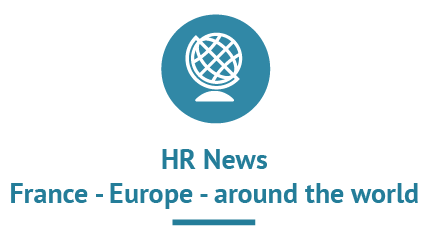|
If you are having trouble viewing this email, please
download the PDF version
or contact us.
|
 |
| #11 - January 2019 |
| PDF version - Manage your subscription - Search - Archives |

|
|
vision RH is a newsletter published by the French Directorate General for Administration and the Civil Service (DGAFP). |
|

|

|
| New HR roles are emerging in the public sector | |||||
|
As a result of changes in organisation and working methods, as well as the growing use of IT systems and digital tools, public sector HR departments are thoroughly reviewing their roles and responsibilities. While this is still a somewhat marginal trend, as shown in a major global survey from 2018,1 the public sector is aware, just like the private sector, of the need to move towards a strategic or even predictive, approach to human resources. In addition to the traditional management functions, there are new roles involving consulting (for career management, work organisation, etc.) and – in some countries – data analysis (data processing can drive simulations or sourcing). These initiatives are still too isolated at local level. However, some countries are launching national approaches: • The UK civil service has set up an HR Digital and Analysis team tasked with supporting the HR transformation. To do so, it has recruited data analytics specialists. • Slovenia’s Ministry of Public Administration has launched an HR efficiency improvement programme, whose goal is to cross data from HR and other sources (notably using the world’s first State Cloud). Similar experiments are being conducted in Australia, Canada, Finland and the UAE. Another country that has led the way, especially for training its HR professionals in the value-added of data, is Singapore. Its Civil Service College has set up a special course that gives HR staff and managers new skills and introduces them to the basics of data analysis. The range of new HR roles covers a scope that goes beyond staff management. For example: • The Belgian federal administration’s Talent Plus career counsellors, trained to provide individualised coaching, and who intervene in various situations • The Maltese civil service’s “People Support and Wellbeing” counsellors, tasked with providing solutions for a better work/life balance for civil servants • The Swedish Agency for Government Employers’ “employer brand” experts, responsible for carrying out projects to promote the government as an employer. IPMA-HR, the International Public Management Association for Human Resources, with more than 10,000 members, is focused on developing innovative solutions to improve perceptions of HR positions in the public sector. By launching its HR 2020 shifting perspectives project, it analyses five topics (leadership, HR culture, talent, communication and technology) through three different perspectives (economic, innovation and strategic focus). Its website includes a self-assessment. |
|||||
|
|||||
|
|
|||||

|
|||||

|

|

|
| A new Commonwealth Integrity Commission in Australia | |||||
|
Already ranked 13th worldwide by the NGO Transparency International, Australia is setting up a new independent authority tasked with strengthening integrity arrangements across the federal public sector. Broader competence and jurisdiction will enable this commission to investigate corruption allegations in all government departments, as well as in all organisations that receive public funds. |
|||||
|
|||||
|
|
|||||

|
|||||
| An act establishing a proactive pay equity regime in the Canadian administration | |||||
|
A new act requires public employers to review their pay practices. A pay equity commissioner, supported by a group of experts, is tasked with assisting employees and facilitating dispute resolution. The commissioner will have the power to conduct audits, carry out investigations, issue binding orders and levy administrative fines. |
|||||
|
|||||
|
|
|||||

|
|||||
| Consultation on the OECD’s draft public sector innovation declaration | |||||
|
The OECD is working to promote public sector innovation with international decision-makers. This has culminated in a draft “Declaration on Public Sector Innovation”, inspired by the French “Manifesto” published in 2017 within this framework. To gather ideas and enrich this draft declaration, a consultation platform will be open to contributions until 22 February. |
|||||
|
|||||
|
|
|||||

|
|||||

|

|
| Spain lifts restrictions on the hiring of staff with medical conditions in the public sector | |||||
|
An agreement signed by the Spanish Ministry of Finance and Public Administration and a group of non-profit organisations will enable seven million people to gain access to certain public sector jobs that they were previously excluded from for medical reasons (including jobs in the armed forces, the police and public safety, customs and the prison services). The Spanish government regards the previous rules as discriminatory and unwarranted. |
|||||
|
|||||
|
|
|||||

|
|||||
| Public sector recruitment goes paperless in South Africa | |||||
|
After a consultation on public sector recruitment shed light on the process’s complexity, inequality in regional access, and especially the lack of appeal for young people and graduates, the South African Administration is launching a fully paperless recruitment procedure. Currently rolled out for five government ministries, it will be mainstreamed in April. |
|||||
|
|||||
|
|
|||||

|
|||||
| Germany’s federal administration modernises its pay scales | |||||
|
The Federal Ministry of the Interior, responsible for the German civil service, has announced draft legislation to “modernise civil servant pay to bolster the appeal of the public sector”. Apart from upgrading certain pay and compensation scales, the main innovation will be the creation of a recruitment bonus for employees that refer a successful candidate for a civil service job. |
|||||
|
|||||
|
|
|||||

|
|||||

|

|
| Norway’s public sector publishes a guide for remote management | |||||
|
A growing number of managers must supervise teams working on several remote sites. To help these managers ensure that all team members are recognised for their work and to maintain a high level of staff commitment, the Norwegian public employment agency has written a guide of best practices for digital resources, conducting meetings and remote monitoring of assignments. |
|||||
|
|||||
|
|
|||||

|
|||||
| The US federal administration assesses its HR strategy | |||||
|
The US federal administration offers the Human Capital Framework (HCF) Diagnostic Tool, designed by experts to help determine an organisation’s strengths and weaknesses in terms of strategic human capital management. Organised around four “HCF systems” (strategic planning and alignment, performance culture, talent management, and evaluation), the tool analyses answers to a series of questions in order to give ideas for better practices. |
|||||
|
|||||
|
|
|||||

|
|||||
| Results of France’s 2018 “digital HR” survey | |||||
|
How digitally mature are HR departments in France in 2018? The most recent annual survey shows a slight increase in maturity. While 53% of companies consider the rise in digital solutions to have optimised HR processes via data collection and 47% see this as a basis for value-added activities, only 16% state that digital solutions have improved relations with staff. |
|||||
|
|||||
|
|
|||||

|
|||||

|

|
| Preventing unemployability: the municipality of Lille is focused on finding solutions | |||||
|
In collaboration with the CNAM (France’s national health insurance system) and union representatives on the health and safety committee, the municipality of Lille has carried out a trial project so that employees deemed incapacitated can become active participants in their employability. 350 cases were selected, resulting in 80 employees receiving new job assignments per year. Bolstered by this success, Lille is now encouraging the beneficiaries of this initiative to become referees/ambassadors. |
|||||
|
|||||
|
|
|||||

|
|||||
| A toolbox to improve wellbeing at work for UK civil servants | |||||
|
The new “A-Z to Better Wellbeing toolkit”, developed by a special team of the UK Civil Service, provides a set of practical advice for employees and managers. Twenty-six keywords were selected, and each is presented in terms of an activity that can be done individually or as part of a team. Related resources are also included: links, training and feedback. |
|||||
|
|||||
|
|
|||||

|
|||||
| Mediation for Swiss federal employees | |||||
|
Settling workplace disputes that cannot be resolved by managers or HR is the purpose of the free mediation service of the Swiss federal administration. Former senior executives working in the mediation unit will examine, from an unbiased perspective, all requests from civil servants and military personnel on numerous topics, following up with confidential interviews. |
|||||
|
|||||
|
|
|||||

|
|||||

|

|
| #WeGenerations, BNP Paribas launches the first intergenerational network for its teams | |||||
|
As careers get longer, three or even four generations work side by side in companies. This is a situation that some companies have decided to turn to their advantage. A survey by OMIG1 revealed that 85% of companies “would made substantial efficiency gains if they built better connections between generations”. BNP Paribas has incorporated the intergenerational dimension into its diversity and social responsibility policy. Operating across subsidiaries and business lines, #WeGenerations facilitates discussions between younger employees and seniors by coordinating several actions and events: • reciprocal mentoring to foster intergenerational cohesion and career opportunities • networking to develop a shared culture and build strong ties • mixed conferences to fuel the emergence of sources of inspiration, to break down stereotypes and open up to others • sharing knowledge through collaborative workshops to discover new trends together and encourage personal development Very successful from the outset, this network assists change, strengthens ties among team members and contributes to knowledge transmission. |
|||||
|
|||||
|
|
|||||

|
|||||

|

|
| With IKB, Dutch civil servants’ compensation is more individualised | |||||
|
Since 1 January 2017, all Dutch civil servants receive variable compensation under a new scheme. This is one of the key measures from a previous three-year agreement with trade organisations and local authorities. The programme has been mainstreamed after proving to be very successful in the departments that tested it. Three bonuses (the summer holiday, year-end and career contribution bonuses), which correspond to 8%, 6.75% and 1.5% of annual pay, respectively, have been combined into a single instrument, with an additional 14.40 hours of paid leave (i.e. 0.8%) being added. What makes this “IKB” (Individueel Keuzebudget) unique is the fact that each employee can decide how to use the total sum now allotted to him or her each year. They can choose any combination of the following options: • convert a portion into additional paid leave (calculated proportionally to their annual pay), limited to 144 hours p.a. FTE • make an additional contribution to their pension fund, in order to boost their future pension • finance their commute or individual training initiatives not paid for by the employer • request payment in cash (on a monthly or year-end basis) Note that the first three options are tax free, making this scheme more attractive. The main goal of this new system is to respond to employees’ changing needs depending on their age, family situation and career advancement. Choices are entirely individual and can be made each year on the p-direkt HR portal. Recently, the Dutch government decided to roll telework compensation into the IKB. As from January 2020, teleworkers will receive €80.23 in monthly compensation for use of their personal space and €1,815 every five years for the purchase of equipment for working at home. With teleworkers comprising 13.7% of the Dutch workforce, the Netherlands is already the EU leader for telework and the Dutch government expects a sharp increase in the public sector thanks to this increased flexibility. |
|||||
|
|||||
|
|
|||||

|
|||||

|
|
Share
|
||||
|
||||
| SUBSCRIBE - UPDATE YOUR SUBSCRIPTION - ARCHIVES - RSS - UNSUBSCRIBE |
|
French Directorate-General for Administration and the Civil Service (DGAFP)
Publication Manager: Thierry LE GOFF Managing Editor: Xavier MAIRE Editor-in-chief: Jean-Marc CHNEIDER Publication Coordinator and Autor: Jean-François ADRIAN Layout and graphic design: Jean-François ADRIAN and Alphania. The texts of the publication do not reflect the point of view of the DGAFP
In accordance to the French Act n°78-17 of 6 January 1978 on information technology, data files and civil liberties and to the european General Data Protection Regulation (GDPR), your personal data is stored securely and you are entitled to access, correct and delete them. To do so, you should send an e-mail to (contact-visionrh.dgafp@finances.gouv.fr) or write to DGAFP: 139, rue de Bercy - 75012 Paris; France.
Reproduction is authorized with mention of the source © DGAFP 2019 / N° ISSN: 2606-7528. |
|
|



